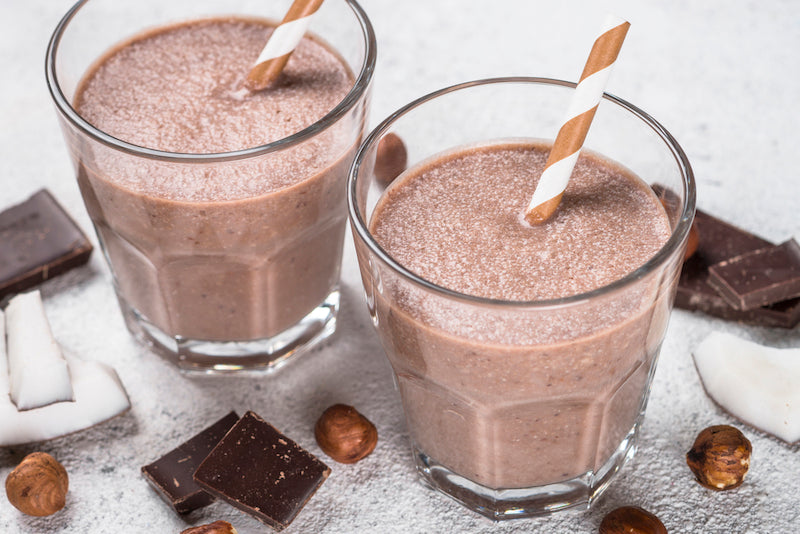An emphasis on protein is required for those looking to build muscle mass.
Although it seems relatively straightforward, loading up on protein immediately after a workout has its limits.
In fact, your body might only be able to use a certain amount of protein in one sitting.
Many people wonder how much protein can your body absorb to maximize muscle gain, and if it's possible to eat too much protein.
This article will explore how the body utilizes protein and will explain how much protein your body can absorb at one time.
What Happens When You Consume Protein?

Protein is an essential macronutrient that has been associated with benefits for weight loss and metabolic health. Because protein-rich foods help people feel satisfied, it may cause them to consume less calories and therefore help support a healthy weight [1, 2].
Protein reduces your body's ghrelin levels, the hormone associated with hunger, while also boosting the hormone peptide YY, which keeps you feeling full.
According to research, a high-protein diet may help reduce overall calorie intake by up to 441 calories per day [3, 4, 5].
Protein is also essential in building and maintaining lean body mass. When you perform a strenuous activity, such as weight lifting, your muscle fibers develop tiny tears from the resistance.
When you consume protein, your body breaks it down into its constituent amino acids, which are absorbed by your intestinal cells and then circulated through the bloodstream. The circulating amino acids are then distributed to areas of need, such as your muscle tissue.
These amino acids help to replenish and repair the muscle tissue to be bigger and stronger, a process known as muscle protein synthesis (MPS).
Unlike carbohydrates which can be stored as glycogen, the body is not able to store protein. Therefore, any extra protein that it cannot utilize is either used for energy or stored as fat [6, 7, 8].
How Much Protein Do I Need Each Day?
Protein requirements will vary by individual but the standard recommendation for most healthy adults is to consume anywhere from 10-35% of their total calories from protein.
For example, if you consume a 2,000-calorie diet, 200-700 calories should come from protein which equals about 50-175g per day.
Another way to calculate protein needs is based on grams per kilogram of body weight per day.
It is encouraged for most healthy adults to consume at least 0.8 grams of protein per kilogram of body weight per day which equals about .35 grams of protein per pound. This means if you weigh 155 lbs, you should aim to consume at least 56 grams of protein per day [8].
If you are trying to build muscle mass, your protein needs are increased. In fact, during this time the American College of Sports Medicine suggests consuming between 1.2-1.7 grams of protein per kilogram of body weight per day [9].
Additionally, if you are trying to lose weight it is important to prioritize protein to preserve lean body mass and target fat mass. Some research suggests that consuming about 1.6 grams of protein per kilogram of body weight is most beneficial for weight loss[10].
Protein Absorption and Muscle Protein Synthesis

Adequate protein intake along with resistance exercise are both essential for muscle protein synthesis to occur.
However, your body can only absorb a certain amount of protein in one sitting.
So how much protein can your body absorb and what happens if you consume too much?
How Much Protein Can Your Body Absorb in One Go?
Most research suggests the body best utilizes between 20-25 grams of protein at one time (within a 1-2 hour period).
Anything outside of that is believed to be used for energy or potentially stored as fat.
Although further research on this is still warranted, studies suggest that there is likely a limited amount of protein that can be utilized during muscle protein synthesis [11].
Instead of consuming your protein in one sitting after a workout, it is suggested that spreading out your protein intake throughout the day over the course of four meals is better to optimize muscle gains and protein absorption. Not to mention, spacing out your protein consumption is better for your digestive system as well.
For example, consuming 0.4 grams per kilogram body weight per meal across four meals would provide 1.6 grams of protein per kilogram per day spread across more evenly.
This could potentially help ensure better utilization of those amino acids versus storing them as fat [11].
Can the Body Absorb More than 30g of Protein?

Protein absorption is unlimited as your body will always be able to digest and circulate amino acids through your bloodstream despite the amount. However, how much protein your body can actually utilize to maximize muscle growth may vary.
Some studies suggest protein utilization limits ranging between 20-25 grams per meal, however, much of this is still under research and will likely vary by individual.
Although it's likely that your body will be able to use most of the amino acids from 30 grams of protein, it's not guaranteed that it will use all of it.
Instead of driving yourself crazy wondering how much protein you should consume in one sitting, it's best to ensure you're getting high quality dietary protein, consuming high protein meals, and evenly distributing your protein intake throughout the day.
What About Excess Amino Acids After a High Protein Meal?
When you eat a high-protein meal, digestive enzymes break the protein down into individual amino acids which are then released into your bloodstream.
These amino acids make their way to your liver which then synthesizes protein.
Any extra amino acids your body doesn't need will then be converted and stored as fat or made into energy if your body is not getting adequate carbohydrates. As with any macronutrient, consuming too much can result in weight gain.
Although, it is more difficult to consume a high protein diet and gain weight than it is to consume a high carbohydrate diet and gain weight due to the high-satiety nature of protein foods.
As we now know, our bodies do not stop absorbing protein when we've ingested 20-25g, so the secondary question of whether or not this has any impact on our ability to build muscle comes into play.
Can You Take Too Much Protein?

Yes, it is possible to consume too much protein in your diet. There is a limit to how much protein your body can absorb to maximize muscle growth. If you consume more protein than your body needs, you may experience weight gain, digestive upset, and it can even take a toll on your kidneys.
Other side effects of too much protein include bad breath, dehydration, and even an increased risk for developing certain diseases.
Unless you are an elite athlete, research suggests that most people can safely consume about 2-2.2 grams of protein per kilogram of body weight per day.
It's unlikely that someone would over-consume protein from simply consuming protein-rich foods. Even if you're following a diet high in animal proteins, it's still unlikely that you'll consume an excessive amount.
However, if you're someone who consumes a lot of protein powder supplements such as whey protein, whey protein isolate, or soy protein, it's easier to overdo it if you're not paying attention to the protein dose.
Protein powder supplements are a great way to help you meet your protein needs, however, be sure to take into account the other protein you're getting from your diet to avoid consuming excess protein.
Should You Spread Your Protein Consumption Throughout the Day?
Most research studies support spreading your protein intake evenly throughout the day to help improve digestion and absorption as well as ensure you are meeting your protein needs.
To do this, aim to consume 20-25 grams of protein during meals and 10-15 grams of protein during snacks. This amount may vary depending on your individual needs.
If you aren't sure if you are eating enough protein or need guidance on how to improve your protein distribution, consider speaking with a Registered Dietitian Nutritionist.
Does Protein Distribution Impact Muscle Mass?
Some recent research has suggested that total protein intake throughout the day plays a more significant role in muscle gain than the total distribution of protein [12, 13, 14].
Although consuming a high-protein meal or snack shortly before or after exercise is beneficial for muscle growth, it might be more important to make sure you are meeting your daily protein needs. Some research suggests that total daily protein intake might be more important than focusing on specific timing of protein intake, however, more research is needed [15, 16, 17].
This doesn't mean you need to strictly calculate the exact grams of protein you are getting at every meal and snack, but it's important to eat protein at every meal and supplement to optimize protein metabolism and body composition.
Should I Take Protein Before or After a Workout?

It has long been believed that consuming a high-protein meal or shake was required post-workout to take advantage of the anabolic window for optimal muscle gain.
However, there is actually conflicting evidence on the best timing for protein to stimulate muscle protein synthesis. While some research has supported the benefits of consuming protein shortly before or shortly after exercise, other studies have found it to not be so impactful.
The general consensus on protein intake and exercise is to consume a high-quality protein source within an hour of working out.
A convenient way to make sure you're getting as much protein in your diet that you need, is to rely on easy protein sources such as whey protein. Simply take your supplement on-the-go and mix into your favorite beverage to ensure you're fueling your body with essential amino acids to encourage muscle building after a workout.
However, as long as you are meeting your daily protein needs, you will likely see the results you are looking for so there's no need to fret too much over it.
Key Takeaways About Protein Absorption
How much protein can your body absorb is a common question among athletes and those looking to optimize their health.
Protein is an essential macronutrient that is compromised of essential amino acids that the body uses for muscle growth, among many other functions throughout the body.
Although most people require approximately 0.8 grams per kilogram of protein, some individuals such as athletes may require more for building muscle mass and optimizing body composition.
Research is mixed on the best time to take protein, but most sources agree that consuming 30 grams of protein at one sitting is ideal, and it's likely beneficial to spread protein intake out throughout the day.
More protein is not always better, and excess protein may lead to weight gain or other unpleasant side effects.







